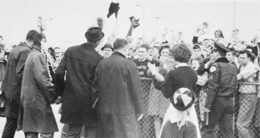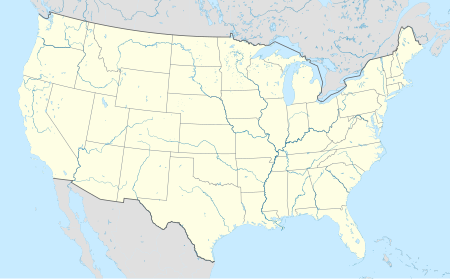1963 NCAA University Division Basketball Tournament
 Cover from the official program | |||||
| Season | 1962–63 | ||||
|---|---|---|---|---|---|
| Teams | 25 | ||||
| Finals site | Freedom Hall Louisville, Kentucky | ||||
| Champions | Loyola Ramblers (1st title, 1st title game, 1st Final Four) | ||||
| Runner-up | Cincinnati Bearcats (3rd title game, 5th Final Four) | ||||
| Semifinalists |
| ||||
| Winning coach | George Ireland (1st title) | ||||
| MOP | Art Heyman (Duke) | ||||
| Attendance | 153,065 | ||||
| Top scorer | Mel Counts Oregon State (123 points) | ||||
| |||||
The 1963 NCAA University Division Basketball Tournament involved 25 schools playing in single-elimination play to determine the national champion of men's NCAA Division I college basketball in the United States. It began on March 9, 1963, and ended with the championship game on March 23 in Louisville, Kentucky. A total of 29 games were played, including a third-place game in each region and a national third-place game.
Loyola University Chicago, coached by George Ireland, won the national title with a 60–58 overtime victory in the final game, over the University of Cincinnati, coached by Ed Jucker. Art Heyman, of Duke University, was named the tournament's Most Outstanding Player. This tournament marked the last time that a city was host to two straight Final Fours.
Locations[]
| Round | Region | Location | Venue |
|---|---|---|---|
| First Round | East | Philadelphia, Pennsylvania | The Palestra |
| Mideast | Evanston, Illinois | McGaw Memorial Hall | |
| Midwest | Lubbock, Texas | Lubbock Municipal Coliseum | |
| West | Eugene, Oregon | McArthur Court | |
| Regionals | East | College Park, Maryland | Cole Field House |
| Mideast | East Lansing, Michigan | Jenison Fieldhouse | |
| Midwest | Lawrence, Kansas | Allen Fieldhouse | |
| West | Provo, Utah | Smith Fieldhouse | |
| Final Four | Louisville, Kentucky | Freedom Hall | |
For the fourth time, Louisville and Freedom Hall hosted the Final Four, the last time a host repeated in back-to-back years. Like the preceding year, all nine venues were either on-campus arenas or the primary off-campus arena for college teams. The tournament saw three new venues being used. For the first time, the tournament came to the state of Michigan, when Jenison Fieldhouse on the campus of Michigan State University hosted games for the first and only time. (All other games held in the state have been in the Detroit metropolitan area.) Texas saw its third host city become Lubbock, when the Municipal Coliseum at Texas Technological College hosted games for the first time. And for the first time, the University of Oregon hosted the tournament at historic McArthur Court, something it would do twice more. Of the nine venues used, only Jenison Fieldhouse would not be used again.
Teams[]
| Region | Team | Coach | Conference | Finished | Final Opponent | Score | Qualification |
|---|---|---|---|---|---|---|---|
| East | |||||||
| East | Connecticut | Yankee | First round | West Virginia | L 77–71 | Yankee Conference champion[1] | |
| East | Duke | Vic Bubas | Atlantic Coast | Third Place | Oregon State | W 85–63 | ACC Tournament champion[1] |
| East | NYU | Lou Rossini | Metro NY | Regional Fourth Place | West Virginia | L 83–73 | At-large bid[2] |
| East | Pittsburgh | Bob Timmons | Independent | First round | NYU | L 93–83 | At-large bid |
| East | Princeton | Butch van Breda Kolff | Ivy League | First round | Saint Joseph's | L 82–81 | Ivy League co-champion[a][3] |
| East | Saint Joseph's | Jack Ramsay | Middle Atlantic | Regional Runner-up | Duke | L 73–59 | MAC champion[4] |
| East | West Virginia | George King | Southern | Regional Third Place | NYU | W 83–73 | SoCon Tournament champion[1] |
| Mideast | |||||||
| Mideast | Bowling Green | Harold Anderson | Mid-American | Regional Fourth Place | Mississippi State | L 65–60 | MAC champion[4] |
| Mideast | Illinois | Harry Combes | Big Ten | Regional Runner-up | Loyola–Chicago | L 79–64 | Big Ten co-champion[b][3] |
| Mideast | Loyola–Chicago | George Ireland | Independent | Champion | Cincinnati | W 60–58 | At-large bid[2] |
| Mideast | Mississippi State | Babe McCarthy | Southeastern | Regional Third Place | Bowling Green | W 65–60 | SEC champion[3] |
| Mideast | Notre Dame | John Jordan | Independent | First round | Bowling Green | L 77–72 | At-large bid |
| Mideast | Tennessee Tech | Johnny Oldham | Ohio Valley | First round | Loyola–Chicago | L 111–42 | OVC champion[4] |
| Midwest | |||||||
| Midwest | Cincinnati | Ed Jucker | Missouri Valley | Runner Up | Loyola–Chicago | L 60–58 | MVC champion[5] |
| Midwest | Colorado | Sox Walseth | Big Eight | Regional Runner-up | Cincinnati | L 67–60 | Big Eight co-champion[c][3] |
| Midwest | Colorado State | Jim Williams | Independent | First round | Oklahoma City | L 70–67 | At-large bid[2] |
| Midwest | Oklahoma City | Abe Lemons | Independent | Regional Fourth Place | Texas | L 90–83 | At-large bid[2] |
| Midwest | Texas | Harold Bradley | Southwest | Regional Third Place | Oklahoma City | W 90–83 | SWC champion[5] |
| Midwest | Texas Western | Don Haskins | Independent | First round | Texas | L 65–47 | At-large bid[2] |
| West | |||||||
| West | Arizona State | Ned Wulk | Western Athletic | Regional Runner-up | Oregon State | L 83–65 | WAC champion[4] |
| West | Oregon State | Slats Gill | Independent | Fourth Place | Duke | L 85–63 | At-large bid[2] |
| West | San Francisco | West Coast Athletic | Regional Third Place | UCLA | W 76–75 | WCAC champion[3] | |
| West | Seattle | Independent | First round | Oregon State | L 70–66 | At-large bid[2] | |
| West | UCLA | John Wooden | AAWU | Regional Fourth Place | San Francisco | L 76–75 | Big Six co-champion[d][3][6] |
| West | Utah State | LaDell Andersen | Independent | First round | Arizona State | L 79–75 | At-large bid[2] |
- ^ Princeton won a tiebreaker play-off game against Fordham to earn a tournament berth.
- ^ Ohio State had been in the previous year's tournament, so Illinois was awarded the tournament berth.
- ^ Colorado had won both their games against co-champion Kansas State that season, so they were awarded the tournament berth.
- ^ UCLA won in a tiebreaker play-off game against Stanford to earn a tournament berth.
Bracket[]
* – Denotes overtime period
East region[]
| Quarterfinals | Semifinals | Finals | ||||||||||||
| Duke | 81 | |||||||||||||
| NYU | 76 | |||||||||||||
| NYU | 93 | |||||||||||||
| Pittsburgh | 83 | |||||||||||||
| Duke | 73 | |||||||||||||
| Saint Joseph's | 59 | |||||||||||||
| West Virginia | 77 | |||||||||||||
| Connecticut | 71 | |||||||||||||
| West Virginia | 88 | |||||||||||||
| Saint Joseph's | 97 | |||||||||||||
| Saint Joseph's | 82 | |||||||||||||
| Princeton | 81* | |||||||||||||
Mideast region[]
| Quarterfinals | Semifinals | Finals | ||||||||||||
| Illinois | 70 | |||||||||||||
| Bowling Green | 67 | |||||||||||||
| Bowling Green | 77 | |||||||||||||
| Notre Dame | 72 | |||||||||||||
| Illinois | 64 | |||||||||||||
| Loyola–Chicago | 79 | |||||||||||||
| Mississippi State | 51 | |||||||||||||
| Loyola–Chicago | 61 | |||||||||||||
| Loyola–Chicago | 111 | |||||||||||||
| Tennessee Tech | 42 | |||||||||||||
Midwest region[]
| Quarterfinals | Semifinals | Finals | ||||||||||||
| Colorado | 78 | |||||||||||||
| Oklahoma City | 72 | |||||||||||||
| Oklahoma City | 70 | |||||||||||||
| Colorado State | 67 | |||||||||||||
| Colorado | 60 | |||||||||||||
| Cincinnati | 67 | |||||||||||||
| Cincinnati | 73 | |||||||||||||
| Texas | 68 | |||||||||||||
| Texas | 65 | |||||||||||||
| Texas Western | 47 | |||||||||||||
West region[]
| Quarterfinals | Semifinals | Finals | ||||||||||||
| UCLA | 79 | |||||||||||||
| Arizona State | 93 | |||||||||||||
| Arizona State | 79 | |||||||||||||
| Utah State | 75* | |||||||||||||
| Arizona State | 65 | |||||||||||||
| Oregon State | 83 | |||||||||||||
| San Francisco | 61 | |||||||||||||
| Oregon State | 65 | |||||||||||||
| Oregon State | 70 | |||||||||||||
| Seattle | 66 | |||||||||||||
Final Four[]
| National Semifinals | National Championship Game | ||||||||
| E | Duke | 75 | |||||||
| ME | Loyola–Chicago | 94 | |||||||
| ME | Loyola–Chicago | 60(OT) | |||||||
| MW | Cincinnati | 58 | |||||||
| MW | Cincinnati | 80 | |||||||
| W | Oregon State | 46 | |||||||
National Third Place Game[]
| National Third Place Game [7] | ||||
| E | Duke | 85 | ||
| W | Oregon State | 63 | ||
Regional Third Place Games[]
|
| ||||||||||||||||||||||||||||||||||||||||||
|
| ||||||||||||||||||||||||||||||||||||||||||
Noteworthy[]

In the Loyola vs. Mississippi State game at East Lansing, Michigan in a Mideast regional semifinal, Mississippi State, an all-white team, played despite protests from the governor and state police of Mississippi. Mississippi State overcame a state prohibition against playing integrated teams. Loyola beat Mississippi State and went on to the Mideast Region Championship game. The Loyola–Mississippi State has since been dubbed the "Game of Change".
In the National Championship game, Loyola started four African-Americans and Cincinnati started three, marking the first time that a majority of African-Americans participated in the championship game.
Loyola's first-round regional victory over Tennessee Tech, 111–42, continues to be a record margin of victory for an NCAA men's basketball tournament game. That game also remains Tennessee Tech's most recent tournament game, as the Golden Eagles have not been back since.
See also[]
- 1963 NCAA College Division Basketball Tournament
- 1963 National Invitation Tournament
- 1963 NAIA Division I Men's Basketball Tournament
- Black participation in college basketball
References[]
- ^ a b c "4 Quintets Gain N.C.A.A. Tourney". The New York Times. New York. 4 March 1963. p. 20. Retrieved 22 June 2020.
- ^ a b c d e f g h "5 Fives Accept Bids to N.C.A.A. Tourney". The New York Times. New York. 19 Feb 1963. p. 16. Retrieved 22 June 2020.
- ^ a b c d e f "Big Six Quintets Will Play Off Tie". The New York Times. New York. 11 March 1963. p. 18. Retrieved 22 June 2020.
- ^ a b c d "1962–63 Conference Standings". College Basketball at Sports-Reference.com. Sports Reference LLC. Retrieved 22 June 2020.
- ^ a b Sheehan, Joseph M. (18 February 1963). "No College Fives Stay Undefeated". The New York Times. p. 17. Retrieved 22 June 2020.
- ^ "U.C.L.A. Wins Title, Downing Stanford". The New York Times. New York. 14 March 1963. p. 16. Retrieved 22 June 2020.
- ^ "1954 NCAA Basketball Tournament Bracket". Retrieved October 14, 2011.
- NCAA Division I Men's Basketball Tournament
- 1962–63 NCAA University Division men's basketball season
- Sports competitions in Louisville, Kentucky
- Basketball in Lubbock, Texas
- 1963 in sports in Kentucky
